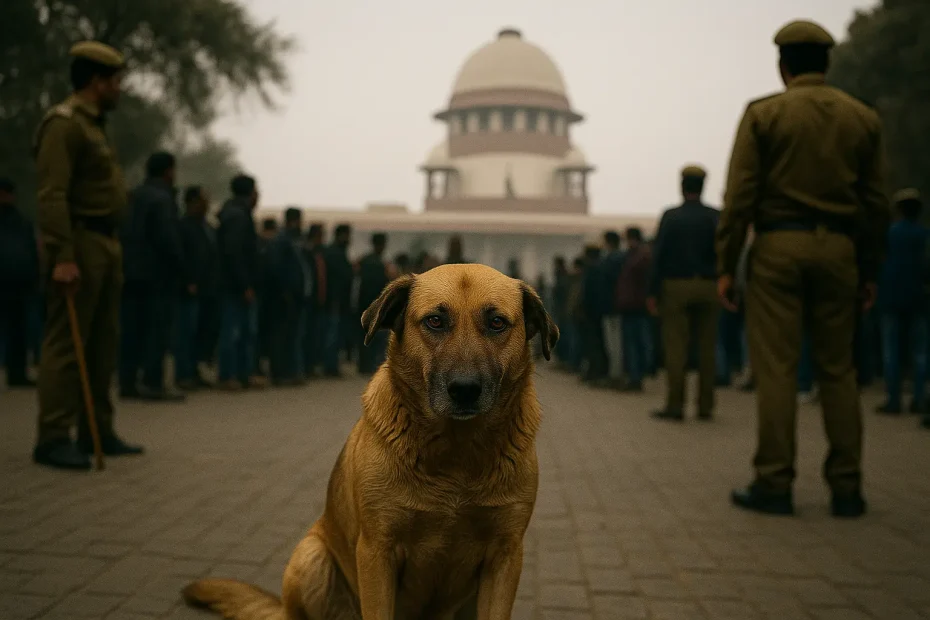In a bold move aimed at curbing the rising incidents of dog bites and rabies in India’s capital region, the Supreme Court, on August 11, 2025, issued a sweeping Stray Dog order directing the removal of all stray dogs from Delhi-NCR localities and their relocation to shelters within eight weeks. The bench, led by Justices JB Pardiwala and R Mahadevan, emphasized public safety, particularly for children, declaring that “no sentiments should be involved” in the process. Authorities in Delhi, Noida, Gurugram, and Ghaziabad are tasked with creating shelters for at least 5,000 dogs initially, establishing a helpline for bite complaints, and ensuring no dogs are released back into public spaces. Obstruction by individuals or organizations could lead to contempt charges, the court warned.
While the order addresses a genuine public health crisis—with over 91,000 dog bites reported in Delhi this year alone and rabies claiming thousands of lives annually—it has ignited a firestorm of criticism from animal welfare advocates, experts, and citizens. Critics argue that the ruling is not only impractical and unscientific but also potentially counterproductive, risking widespread animal suffering and failing to solve the root problem.
The Backlash: Unfeasible and Inhumane?
Animal rights groups have been quick to condemn the decision. The Federation of Indian Animal Protection Organisations (FIAPO) described it as “shocking” and a violation of the Animal Birth Control (ABC) Rules, 2003, which mandate sterilization and vaccination rather than mass relocation. PETA India echoed this, calling the order “cruel” and warning that displacement has “never worked,” as it creates a “vacuum effect” where new dogs move in, potentially exacerbating rabies spread. Former Union Minister and animal activist Maneka Gandhi labeled the plan “impractical and financially unviable,” pointing out the enormous challenge of sheltering an estimated 600,000 to 1 million strays in Delhi-NCR alone.
Protests erupted in Delhi shortly after the ruling, with activists detained while demonstrating against what they see as a “death sentence” for strays, given the lack of adequate shelters. On social media platform X (formerly Twitter), the debate has been heated. One user lamented it as an “extremely sad day in the history of the country,” criticizing the government’s inaction and tagging Prime Minister Narendra Modi. Another called the order “draconian,” comparing it to banning cars over road accidents and accusing the court of hypocrisy in handling human encroachments. Socio-political activist Chandra Kumar Bose deemed it “the most ridiculous order,” asserting that stray dogs have a right to coexist in communities.
Even legal experts have raised eyebrows. Advocate Dhruv Sharma described the ruling as “bizarre,” warning of potential mass protests by animal lovers and urging the court to reconsider sentiments and involve stakeholders. The Guardian reported international concern, noting that while the order cites child safety, it overlooks humane alternatives endorsed by global bodies like the World Health Organization (WHO).
Why Mass Relocation Might Backfire
The court’s rejection of the ABC program’s core principle—sterilizing and returning dogs to their territories—has drawn sharp scrutiny. Justice Pardiwala questioned the “absurd” rule of releasing sterilized dogs, but experts counter that this approach has successfully reduced populations and rabies in cities like Chennai and Jaipur. Relocation disrupts territorial stability, leading to increased aggression among dogs and higher rabies transmission risks, as unvaccinated newcomers fill the void.
Financially, the mandate is daunting. Building shelters for thousands of dogs requires massive infrastructure, staffing, and ongoing funding—estimated to cost crores—that civic bodies like the Municipal Corporation of Delhi (MCD) may struggle to provide. The order’s ban on adoptions further limits options, potentially leading to overcrowded facilities where dogs face neglect or euthanasia, despite the court’s insistence on CCTV monitoring.
Solicitor General Tushar Mehta highlighted YouTube videos of rabies tragedies to justify urgency, but critics argue this emotional appeal ignores data: India’s rabies deaths stem more from inadequate vaccination access than dog numbers alone. The Indian Express noted that the Supreme Court itself has previously ruled against relocation in favor of ABC methods as recently as 2022.
A Call for Balanced, Humane Solutions
While public safety is paramount—no child should fear rabies—the order risks prioritizing short-term optics over long-term efficacy. Instead, authorities should ramp up the ABC program: mass sterilization, vaccination drives, and community education on responsible feeding and reporting aggressive dogs. Collaborating with NGOs like PETA and FIAPO could ensure ethical implementation, as suggested by Amicus Curiae Gaurav Agarwal during the hearing.
The divide is clear: supporters hail it as a “necessary step” for safety, while detractors warn of ecological imbalance and cruelty. As the matter returns to court in six weeks, there’s an opportunity for reconsideration. India, with its rich tradition of compassion toward all beings, deserves a policy that protects both humans and animals without resorting to blanket removals.
In the end, sentiments should be involved—compassionate, evidence-based ones that foster coexistence rather than conflict. The Supreme Court must heed the outcry and pivot toward sustainable rabies control, lest this order become a tragic misstep in the fight against a preventable disease.
